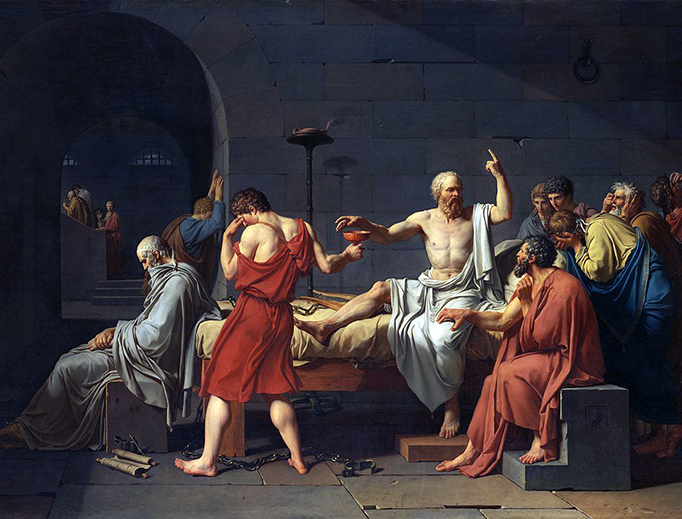Better to be Socrates Dissatisfied Than a Pig Satisfied
I shall always be grateful to a strange and wonderful teacher who introduced me to a world where universal truth and value do exist.

I remember the experience as though it had happened only yesterday. It was the very first day of class and everyone was nervous. Not only were we new to the school, but no one seemed to have a clue about the course we’d all been assigned to take. Ethics. What on earth could that be? And where was the professor? Why wasn’t he there to tell us?
All at once, he burst into the room and, throwing his briefcase on the desk, turned his icy eyes upon us, imperiously pronouncing that there were only two options before us and that we had only one minute to make up our minds.
“Either become pigs satisfied!” he demanded. “Or Socrates dissatisfied!”
Now that was an ice-breaker. Even now, a half-century later, the memory remains fresh and vivid.
So how did we decide? Not, it shames me to say, in any sort of calm or disinterested way. Because none of us had ever even heard of Socrates. As regards the porcine alternative, however, now that was a subject about which we were all fairly expert, even if most of us had never been within a hundred miles of a farm.
So the vote was unanimous. We would all become Socrates. “You have chosen wisely,” he commented. “But,” his voice becoming stern and menacing once more, “in the end the choice will cost you your life. Of course,” he added confidingly, “it is better to be Socrates dissatisfied than a pig satisfied.”
One does not easily forget a speech like that, not even if one were a callow undergraduate, who had never read a word of philosophy in his life. But especially not if one had, at that very instant, resolved to overcome so vast and pathetic an ignorance. To begin, indeed, to live as though nothing in the world mattered more than to try and imitate and, yes, even if it meant death, someone as splendidly heroic as Socrates. Who, because he believed “the unexamined life not worth living,” the Athenian mob would eventually kill him.
But while the mob could always silence Socrates, forcing him to take the fatal dose of hemlock, it could never refute his arguments. Which, like a golden thread, would run through the whole sweep of Western thought. It was a fact we were often reminded of during those heady days which followed, that here was the wisest of the Greeks, who sought only to know all that he did not know, and whose inspired words were piously preserved by his great student and exegete, Plato, concerning whom all philosophy since has been but a single unending footnote.
In Plato’s great work, The Republic, the place where the mind of Socrates is given brilliant and profound play, we learned how the truth of being, of the whole moral order, is wedded to the Good, which he calls Agathon, its status lifted high into the realm of divinity itself. So enthralled was young Glaucon by this sublime thought that, bursting forth with intoxicated ardor, he exclaims, “You speak of an inconceivably transcendent Beauty!”
It would be many years before I’d connect the deepest dots, linking Socrates to Jesus — the former having been, in the expressive phrase of Hans Urs von Balthasar, “a baptizable anticipation,” or that great dollops of grace would be needed to consummate the longing for the Good. In other words, the ethical life would finally turn on a Person, who was himself the embodiment of the Good. But I shall always be grateful to that strange and wonderful teacher who, in his own secular way, first introduced me to a world where universal truth and value do most emphatically exist. A world whose validity, he would fiercely insist, does not depend on human subjectivity, convenience, or whim. But that good and evil remain real distinctions; and that the cultivation of the soul, its pursuit of ethical excellence, will necessarily exclude certain practices of which no civilized man could possibly approve. One does not kill one’s own offspring, or eat one’s neighbor, or seduce his wife, or steal his chickens. That way lies barbarism, leading to the collapse of any standard to which an appeal might be made.
“Where do these prohibitions come from?” he would ask. The immemorial taboo against incest, for instance, or pedophilia, the homosexual pair bond? Do they come from within, as if already inscribed in the structures of the human heart, or are they communicated from without, as if by God himself? Why not both? he would suggest. Do I not discover in myself a point of origin, of balance, beyond myself, a fixed standard transcending everything, which holds me to the fire of righteousness and truth?
An old North African bishop by the name of Augustine, who was himself a philosopher and whose writings I would also one day come across, once wrote, “Where I am most inwardly myself, there You were far more than I.” A saint and Doctor of the Church, no less, I’d like to think he would have appreciated my teacher from 50 years ago and, who knows, perhaps they know one another now.

















